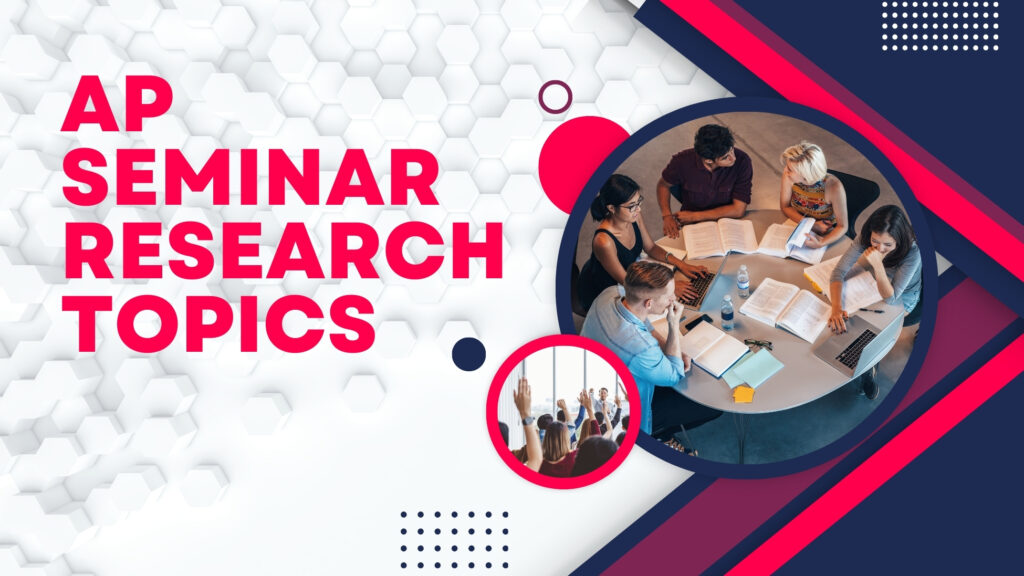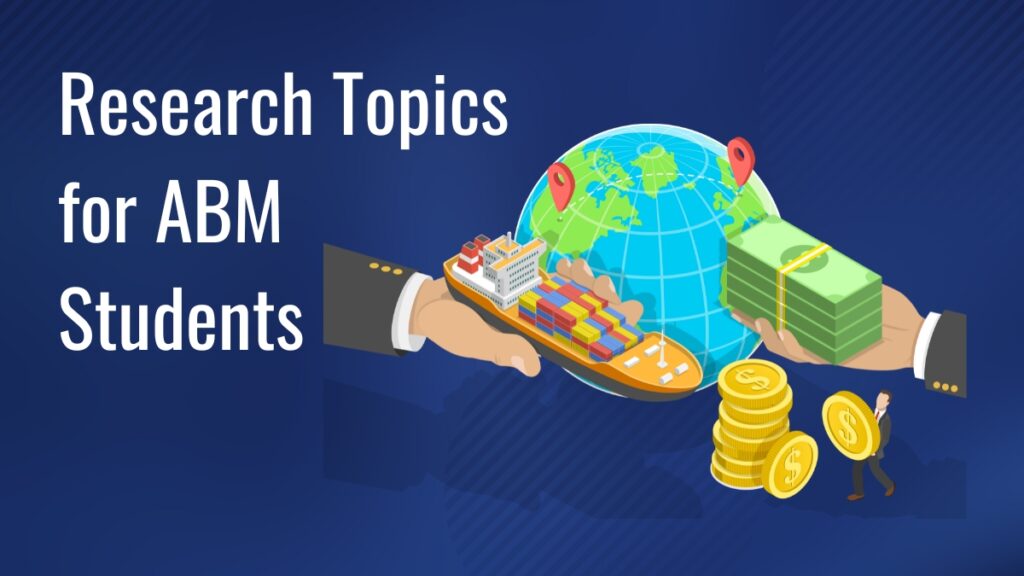Discover engaging AP Seminar research topics that inspire critical thinking and in-depth analysis. Explore diverse subjects, from social issues to scientific advancements, perfect for your next academic project.
The AP Seminar course is all about diving into independent research and thinking critically. The first big step? Choosing a research topic that really excites you.
This guide will help you get started on this exciting journey. Let’s dive in and find the perfect topic for your research adventure!
AP Seminar Research Topics PDF
Importance of choosing a strong research topic For AP Seminar
Choosing a strong research topic is key to succeeding in your AP Seminar course. Here’s why:
- Focus: A clear topic keeps your research on track.
- Interest: A topic you care about makes research easier and more enjoyable.
- Challenge: A strong topic encourages deep thinking and analysis.
- Skills: It shows your ability to research and evaluate information.
- Course Fit: It meets the AP Seminar requirements.
A well-chosen topic sets you up for a successful research experience.
Core Components of AP Seminar
- Individual Research: Conduct independent research, create a strong question, gather evidence, and build an argument.
- Team Research: Collaborate on a shared question, focusing on teamwork and communication.
- Oral Presentations: Present findings individually and as a team, showing communication skills.
- Written Argument: Write a well-supported, persuasive argument based on research.
The Role of Research in AP Seminar
- Identify a Question: Define what you’re investigating.
- Gather Information: Collect relevant data.
- Evaluate Sources: Check the credibility and relevance.
- Synthesize Information: Combine data to form a coherent argument.
Key Characteristics of a Strong Research Question
- Clear: Directly addresses the topic.
- Feasible: Can be answered with available resources.
- Relevant: Significant and impactful.
- Open-ended: Allows for multiple viewpoints.
- Interdisciplinary: Connects different fields.
Importance of Interdisciplinary Research
- Combine Disciplines: Use knowledge from various fields.
- Find Connections: Identify links between subjects.
- Solve Problems: Approach issues from different angles.
- Foster Innovation: Develop new ideas and methods.
These core components and interdisciplinary research are key to success in AP Seminar and in developing valuable skills.
Criteria for Selecting a Research Topic for AP Seminar
Choosing the right research topic is key for AP Seminar success. Consider:
- Interest: Pick a topic you’re excited about.
- Relevance: Choose something with real-world impact.
- Feasibility: Ensure you can find enough reliable sources.
- Scope: Find a topic that’s neither too broad nor too narrow.
- Interdisciplinary: Look for topics you can explore from different angles.
- Question: Develop a clear and focused research question.
These tips will help you select a topic that enhances your learning experience.
Brainstorming Research Topics for AP Seminar
Brainstorming helps you find a great research topic. Try these ideas:
Personal Interests
- What are your hobbies and passions?
- What problems or issues have you faced?
- What social or political topics matter to you?
Current Events
- What big events are happening now?
- What issues are affecting society?
- How do these connect to your interests?
Academic Fields
- Explore different subjects.
- Look for connections between fields.
- Identify areas you want to learn more about.
Mind Mapping
- Use a mind map to organize ideas.
- Connect related concepts.
- Find potential research questions.
Free Writing
- Write down any ideas without worrying about structure.
- Explore different angles and perspectives.
Developing a Strong Research Question
A strong research question is key for your AP Seminar project. It should be:
- Clear and Concise: Easy to understand.
- Specific: Focuses on a particular aspect.
- Arguable: Prompts discussion, not just a yes/no answer.
- Relevant: Fits your interests and course goals.
- Feasible: Answerable with your resources and time.
Steps to Develop a Good Question
- Brainstorm and Refine: Make sure your topic is focused.
- Preliminary Research: Check what’s already known.
- Identify Gaps: Find what’s missing.
- Formulate Questions: Create several options.
- Evaluate and Refine: Pick the best question.
Example
- Broad Topic: Social media
- Narrowed Topic: Impact on teenage body image
Questions
- How does idealized body imagery on social media affect teenage girls’ body image?
- What role does social comparison play in body image issues for teens?
A good question guides your research effectively.
AP Seminar Research Topics
Check out AP Seminar research topics:-
Environmental Science
- Coral Reefs and Climate Change: Impact of rising sea temperatures.
- Urban Green Spaces: Benefits for air quality and health.
- Habitat Destruction: Effects on local wildlife.
- Water Pollution: Sources and effects on ecosystems.
- Renewable Energy: Emerging technologies and impacts.
- Waste Management: Strategies to reduce landfill use.
- Conservation Programs: Success in protecting species.
- Climate Adaptation: Strategies for communities.
- Plastic Alternatives: Potential of biodegradable materials.
- Forest Management: Practices affecting forest health.
Technology and Society
- AI in Healthcare: Impact on diagnostics and care.
- Ethical AI: Guidelines for AI development.
- Social Media and Elections: Influence on politics.
- Tech in Education: Enhancing learning outcomes.
- Digital Privacy: Issues in the digital age.
- Tech Addiction: Strategies to reduce it.
- Virtual Reality: Applications in various fields.
- Blockchain Technology: Security and transparency.
- Smart Cities: Benefits and challenges.
- Surveillance Ethics: Considerations and impact.
Health and Medicine
- Telemedicine: Effectiveness in rural areas.
- Mental Health Interventions: Improving adolescent care.
- Vaccination Strategies: Impact on disease prevention.
- Nutritional Trends: Effects on long-term health.
- Healthcare Policy: Recent changes and outcomes.
- Chronic Disease Management: Various approaches.
- Medical AI Tools: Enhancing diagnostics and treatment.
- Public Health Campaigns: Promoting healthy behaviors.
- Healthcare Accessibility: Barriers for underserved populations.
- Medical Device Innovations: Recent advancements.
Education
- Online Learning Platforms: Comparing outcomes.
- Student Engagement: Methods for virtual classrooms.
- Impact of Homework: On performance and well-being.
- Diverse Learning Needs: Accommodation strategies.
- Technology Integration: Benefits in curricula.
- Teacher Development: Impact on teaching effectiveness.
- Parental Involvement: Influence on academic success.
- Education Equity: Promoting equal opportunities.
- Gamification: Enhancing student learning.
- School Environment: Effects on learning and behavior.
Economics
- Minimum Wage Policies: Effects on employment.
- Supply Chain Disruptions: Causes and consequences.
- Pandemic Impact: On various sectors.
- Consumer Spending Trends: In the digital economy.
- Income Inequality Solutions: Reducing disparities.
- Gig Economy: Benefits and drawbacks.
- Trade Agreements: Impact on global relations.
- Cryptocurrency Regulation: Effects on markets.
- Economic Development: Strategies for emerging economies.
- Behavioral Economics: Improving financial decisions.
Politics and Government
- Election Reform: Improving electoral integrity.
- Lobbying Impact: Influence on public policy.
- Government Surveillance: Balance with privacy.
- Political Polarization: Causes and effects.
- Human Rights Policies: Protecting vulnerable populations.
- Decentralization: Benefits and challenges.
- Crisis Response: Government actions in crises.
- Youth Engagement: Increasing political involvement.
- Social Movements: Influencing policy.
- Government Transparency: Effects on trust and accountability.
Culture and Society
- Globalization: Impact on cultural identity.
- Media Representation: Effects on societal attitudes.
- Cultural Heritage: Preserving traditions.
- Migration Impact: On host communities.
- Gender Equality Movements: Effectiveness in different countries.
- Social Media Activism: Role in social change.
- Cultural Exchange Programs: Promoting understanding.
- Youth Culture: Influence on societal values.
- Digital Media: Shaping cultural trends.
- Cultural Festivals: Promoting heritage and tourism.
Science and Innovation
- Space Exploration: Latest advancements.
- Genetic Research Ethics: Ethical issues.
- Renewable Energy: New technologies.
- Biotechnology: Addressing health challenges.
- AI in Research: Transforming discoveries.
- Nanotechnology: Innovations and applications.
- Climate Engineering: Potential solutions.
- Science Communication: Effective methods.
- Robotics Future: Applications and ethics.
- Interdisciplinary Research: Solving complex problems.
History and Philosophy
- Historical Events: Long-term impacts.
- Ethics Philosophy: Decision-making approaches.
- Cultural Influences: Shaping historical narratives.
- Historical Revisionism: Understanding past events.
- Philosophy of Science: Implications of discoveries.
- Comparative History: Addressing similar issues.
- Philosophical Movements: Influence on thought.
- Historiography: Methods of historical interpretation.
- Historical Figures: Contributions and legacies.
- Ethics Over Time: Evolution of standards.
Sociology
- Tech and Society: Effects on relationships.
- Social Stratification: Access to resources.
- Family Structure: Impact on development.
- Urbanization: Effects on communities.
- Social Movements: Driving change.
- Workplace Dynamics: Employee satisfaction.
- Social Media Influence: On socialization and identity.
- Crime Theories: Application in modern contexts.
- Youth Culture: Impact on values.
- Socialization Processes: Learning societal norms.
Business and Management
- Entrepreneurship Ecosystems: Key factors.
- Leadership Styles: Effects on performance.
- Corporate Social Responsibility: Enhancing brand reputation.
- Digital Transformation: Benefits and challenges.
- Consumer Behavior: Influencing strategies.
- Business Innovation: Maintaining competitive advantage.
- Workplace Diversity: Impact on outcomes.
- Strategic Management: Approaches to business goals.
- Financial Management: Strategies for businesses.
- Market Entry: Strategies for international success.
Media and Communication
- Fake News Impact: On public opinion.
- Media Consumption: Changing habits.
- Role of Journalism: In democracy.
- Digital Media Influence: On trends.
- Media Representation: Effects on attitudes.
- Crisis Communication: Managing during crises.
- Advertising Strategies: Impact on behavior.
- Media Literacy: Combating misinformation.
- Social Media Influencers: Role and impact.
- Communication Technology: Evolution and impact.
Law and Criminal Justice
- Criminal Justice Reform: Improving fairness.
- Juvenile Justice: Reducing recidivism.
- Forensic Technology: Advancements and impact.
- Rights of the Accused: Protections and challenges.
- Sentencing Disparities: Causes and consequences.
- Legal Ethics: Dilemmas faced by professionals.
- Policing Strategies: Maintaining safety.
- Victim Rights: Treatment in the system.
- Drug Policy: Impact on crime and health.
- International Criminal Law: Addressing global crimes.
Art and Literature
- Art Movements: Influence on practices.
- Literary Themes: Societal implications.
- Cultural Impact of Art: Reflecting changes.
- Digital Art: Impact on traditional forms.
- Representation in Literature: Diverse identities.
- Art and Activism: Role in social change.
- Literary Criticism: Approaches to texts.
- Public Art: Community engagement.
- Art Therapy: Use in mental health.
- Historical Art Analysis: Depicting events.
Space and Astronomy
- Exoplanet Detection: Methods and findings.
- Space Mission Design: Planning and challenges.
- Astrobiology: Potential for life.
- Space Weather: Effects on satellites.
- Space Habitats: Creating sustainable environments.
- Cosmic Phenomena: Black holes and supernovae.
- Satellite Technology: Advancements and uses.
- Space Tourism: Potential impacts.
- Astronomical Instruments: For observing objects.
- International Space Collaboration: Benefits and challenges.
Conducting Preliminary Research
Preliminary research is key for your AP Seminar project. Here’s how to do it:
Find Sources
- Databases: Use JSTOR, Google Scholar, and your library.
- Books: Look at scholarly and general books.
- Articles: Check journals and news.
- Websites: Ensure they’re credible.
Search Smart
- Keywords: List terms related to your topic.
- Operators: Use AND, OR, NOT to refine searches.
- Limiters: Filter by date, type, etc.
Evaluate Sources
- Credibility: Check the author and publication.
- Relevance: Ensure it fits your topic.
- Bias: Look for any bias.
- Currency: Verify the info is up-to-date.
Take Notes
- Summarize: Note key ideas.
- Paraphrase: Put info in your own words.
- Quote: Use exact wording when needed.
- Cite: Record all sources.
Organize
- Bibliography: Track all sources.
- Outline: Arrange your findings.
- Identify Gaps: Spot areas needing more research.
Good preliminary research sets a solid foundation for your project.
Research Methodology
Research methodology is the plan for how you conduct research. It helps ensure your findings are reliable and valid.
Key Components
- Research Design: Your overall research strategy.
- Data Collection: Methods like surveys, interviews, or experiments.
- Data Analysis: Techniques for interpreting data, like statistical or qualitative methods.
- Sampling: Choosing a representative group from your population.
- Ethics: Protecting participants and ensuring data integrity.
Types of Research Methodology
- Quantitative: Collects and analyzes numerical data.
- Qualitative: Explores meanings and experiences.
- Mixed Methods: Combines both quantitative and qualitative approaches.
Why It Matters
- Structure: Guides your research process.
- Validity: Ensures credible results.
- Replicability: Allows others to reproduce your study.
- Transparency: Clearly outlines your procedures.
A well-defined methodology sets the stage for reliable and insightful research.
Creating a Research Plan
A solid research plan guides your project from start to finish. Here’s what you need:
Key Components
- Research Question: Define your study’s focus.
- Objectives: Set clear goals.
- Literature Review: Summarize existing research.
- Methodology: Outline your approach, including data collection and analysis.
- Data Collection: Explain how and where you’ll gather data.
- Data Analysis: Describe how you’ll interpret it.
- Timeline: Create a schedule for each phase.
- Ethics: Address potential ethical issues.
- Budget: List financial needs.
- Dissemination: Plan how to share your findings.
Creating a Realistic Timeline
- Break Down Tasks: List all steps.
- Allocate Time: Set timeframes for each task.
- Plan for Delays: Add extra time for unexpected issues.
Using Templates
Downloadable templates can help you organize your plan effectively.
Following these steps will keep your AP Seminar project on track.
Presentation and Communication
Good communication is key to sharing your findings and engaging your audience. Here’s how to do it effectively:
Crafting Your Presentation
- Clear and Concise: Focus on main points; avoid overload.
- Visual Aids: Use visuals to clarify and engage.
- Storytelling: Create a narrative to connect with your audience.
- Practice: Rehearse to build confidence.
Delivery Techniques
- Eye Contact: Connect with your audience.
- Body Language: Use gestures and posture to support your message.
- Vocal Variety: Vary tone, pace, and volume to keep interest.
- Q&A Prep: Anticipate questions and prepare responses.
Audience Engagement
- Know Your Audience: Tailor content to their interests and knowledge.
- Interactive Elements: Use questions, polls, or activities.
- Seek Feedback: Encourage and respond to audience comments.
Communication Channels
- Oral Presentations: Verbally share information.
- Written Reports: Formal written documents.
- Multimedia: Combine visuals and audio.
- Digital Platforms: Use online tools for sharing.
Master these elements to effectively communicate your research and make a strong impression.
Best Ap Seminar Research Topics
Selecting the right topic is key to a successful project. Here are some ideas across various fields:
Social Sciences
- Psychology: Social media’s effect on mental health, sleep deprivation and cognitive function.
- Sociology: Social class and education, media influence on body image.
- Economics: Globalization’s impact on local economies, effectiveness of government stimulus.
- Political Science: Lobbyists’ influence on laws, effectiveness of foreign aid.
Humanities
- Literature: Women’s representation in classic literature, evolution of literary genres.
- History: Technology’s impact on history, causes and effects of specific conflicts.
- Philosophy: Ethics of artificial intelligence, nature of consciousness.
- Art History: Art movements’ influence on society, symbolism in artworks.
Science
- Biology: Climate change and biodiversity, ethics of genetic engineering.
- Chemistry: Chemistry in daily life, new material development.
- Physics: Renewable energy potential, quantum computing implications.
- Environmental Science: Pollution effects on ecosystems, impact of deforestation.
Interdisciplinary Topics
- Technology and Society: Social media’s impact on democracy, AI ethics.
- Health and Environment: Climate change and public health, diet’s role in disease prevention.
- Economics and Culture: Globalization of culture, economic impact of cultural heritage.
Choose a topic that excites you and offers room for deep exploration.
How to pick a research topic in AP Research?
Choosing Your AP Research Topic
Identify Your Interests
- Passion: Pick something you love.
- Strengths: Focus on your strengths.
- Curiosity: Choose topics that intrigue you.
Brainstorm and Explore
- Mind Mapping: Visualize ideas.
- Free Writing: Jot down thoughts.
- Current Events: Look at recent news.
- Disciplines: Explore different subjects.
Consider Feasibility
- Data: Ensure data is available.
- Time: Pick a topic that fits your schedule.
- Resources: Check if you have needed resources.
Develop a Research Question
- Clear: Make it specific.
- Arguable: Ensure it invites analysis.
- Feasible: Confirm it’s answerable with your resources.
Consult with Teachers and Mentors
- Guidance: Discuss with your teacher or mentors.
- Feedback: Get their input on your topic.
Refine Your Topic
- Adjust: Be ready to tweak your topic.
- Focus: Keep it manageable.
Choose a topic that interests you and is practical to research. Brainstorm, check feasibility, and seek advice.
What makes a good research question AP Seminar?
A great research question is essential for a successful AP Seminar project. It should be:
- Clear and Focused: Easy to understand and specific.
- Arguable: Promotes discussion and analysis.
- Researchable: Can be explored with available data.
- Significant: Adds to the broader understanding of the topic.
- Open-ended: Allows for various perspectives.
Example
- Weak: Does social media affect mental health?
- Strong: How does excessive social media use relate to higher anxiety and depression levels among adolescents?
Key Qualities
- Prompts Inquiry: Stimulates curiosity.
- Involves Critical Thinking: Requires evidence analysis.
- Allows Multiple Perspectives: Considers different viewpoints.
- Manageable: Provides a clear focus.
A well-crafted research question sets the foundation for a meaningful AP Seminar project.
Conclusion
Choosing a compelling research topic is crucial for a successful AP Seminar experience. By aligning your interests, conducting in-depth research, and crafting a clear research question, you’ll set the stage for an engaging intellectual journey.
The best topics ignite your curiosity and offer a chance to contribute something new to the field. With thoughtful planning and commitment, you’ll develop a research project that highlights your critical thinking, research skills, and communication prowess.
Happy researching!



